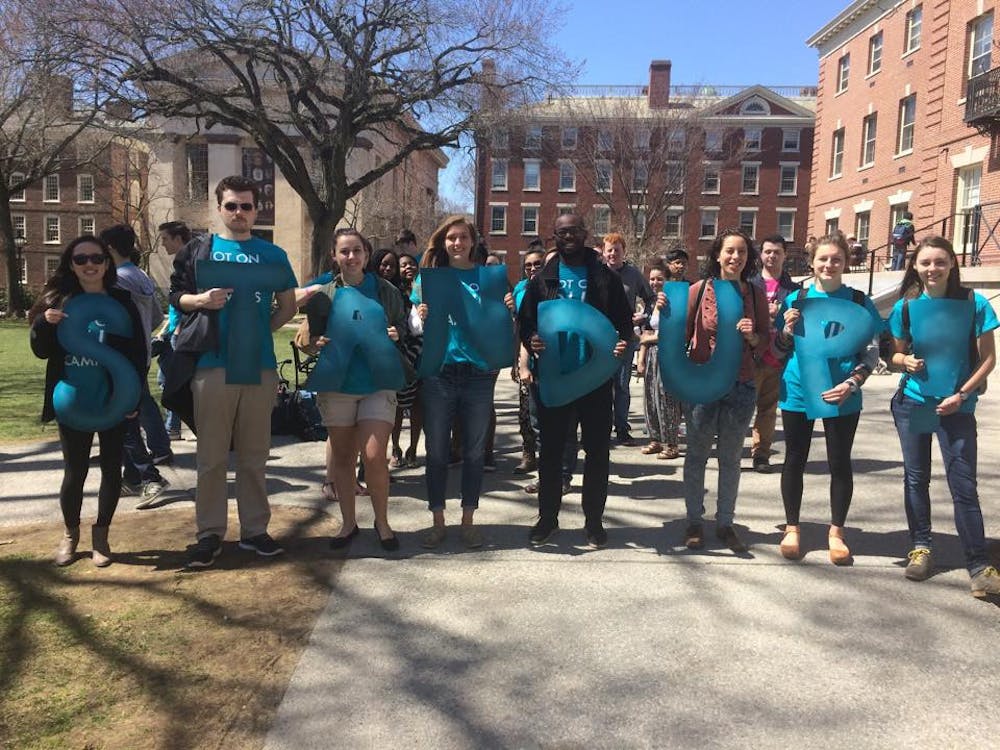A swarm of about 40 students dressed in teal shirts converged on the Main Green Sunday to raise awareness about sexual assault at Brown in the second annual March Against Sexual Assault. The students, whose shirts read “not on our campus,” paraded around and chanted slogans during the event, which was organized by Stand Up!, a group that works to prevent sexual assault on campus.
Sunday’s sunny weather drew several students to the Main Green, increasing the event’s visibility and attendance. Students “fluidly” joined the march, said Emily Schell '16, co-founder of Stand Up!.
Schell stressed the group’s goal of “bringing people who might want to be involved in the conversation but might not know how” together to discuss the issue of campus sexual assault and show support for survivors. “When it comes to this issue, people think that they’re alone. They feel unsupported,” Schell said, adding that the march was a way for community members to demonstrate they cared.
After the march, students sat beneath the steps of the Stephen Robert ’62 Campus Center and listened to a keynote address by Wagatwe Wanjuki, whose experience as a survivor shaped her career of activism. Wanjuki emphasized the importance of respecting intersectionality and avoiding a traditional narrative when talking about sexual assault.
Wanjuki categorized rape as a form of oppression and stressed the necessity of sharing the stories of people with marginalized identities, especially because they are more often targeted for sexual violence. She also noted the shift in media attitudes toward sexual assault and legislative trends in bringing justice to survivors.
“Honestly, the focus on intersectionality for me personally is just the most important thing,” said Maahika Srinivasan ’15, president of the Undergraduate Council of Students. “It’s heartening to see someone come in and basically tell us to be more circumspect about the kinds of activism that we’re pushing for,” she said.
“When we say activism, we have to be inclusive. We have to be thoughtful and aware of all the things we’re trying to incorporate — all of the people we’re trying to speak for,” Srinivasan added. Affirmations from Wanjuki are a “really wonderful reminder, especially after a year of really incredible activism on campus around sexual assault.”
Members of Stand Up! sold shirts for the event in the Blue Room last week for $5 each. They donated all profits to Day One and the Sojourner House — organizations that offer services to survivors of sexual assault and domestic violence. Schell noted that both organizations provide support services outside of University resources.
“This event has a lot of power and has a lot of potential because of how it tries to access different groups from different corners of campus,” said Heather Sweeney ’16, an event organizer. “This is a campus-wide problem that needs a campus-wide response. We need everybody to be caring about this issue.”
Wanjuki told The Herald after her talk that the number of spaces for discussion about sexual assault has increased since her time in college, as evidenced by her invitation to speak on campus. “Before, it was really hard to get the media to pay attention to survivors of sexual violence, and now we hear something almost every day,” she said. “So it’s a household issue now, which I think is really great.”
Wanjuki said she supports the efforts of elected representatives pushing to pass bills and student activists advocating safer campuses around the country. “It was really inspiring just to see students out in broad daylight … on a weekend,” she said. “This is definitely the beginning of something great.”
A previous version of this article reported that Wanjuki spoke of people with marginalized identities being targets of sexual violence. More specifically, she said they are more frequently targeted by acts of sexual violence.





